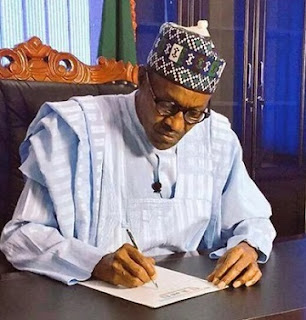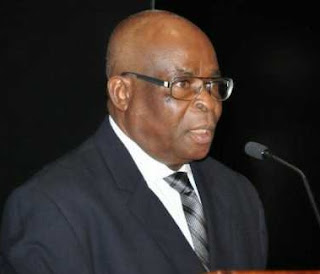At Last, Presidency Clears Onnoghen As Substantive CJN
The Acting Chief Justice of Nigeria (CJN) Walter Onnoghen has finally been cleared of all gray areas bedeviling his confirmation in a substantive capacity.
The Presidency may send his name to the Senate for confirmation “any moment from now”, a report according to
The Nation Newspaper says
Onnoghen's nomination may either be sent by President Muhammadu Buhari or Vice President Yemi Osinbajo, depending on when the President’s vacation ends. He has asked for an extension,
The Nation further says
A security report on Justice Onnoghen is said to have been centred on “the fact that he is reform-minded and suitable for the anti-corruption agenda of the Buhari administration”.
The Presidency is believed to have received the report.
A government source said: “All hurdles against the nomination of Justice Walter Onnoghen as CJN have been resolved. He has been absolved of all allegations against him.
“As a matter of fact, the nomination was delayed as a result of the need to address these allegations. Now, Justice Onnoghen has been given a clean bill of health.
“Every allegation was investigated and proofs indicated that Onnoghen has no case to answer. The government went to this extent to ensure that the holder of the office of CJN is above board.”
The source dismissed the insinuations that the delay in nominating Justice Onnoghen had to do with his being a Southerner.
“There were issues against him and it became imperative to get to the roots of these allegations,” he said, adding: “More IMPORTANTLY, the outcome of the security checks rated Onnoghen as ‘reform-minded and suitable for anti-corruption agenda of Buhari administration’.
Justice Onnoghen’s appointment as Acting CJN will end on February 10.
Justice Onnoghen underwent security checks by the Department of State Services (DSS) and other agencies in the light of the ongoing probe of some judges of the Supreme Court.
Some of the checks focused on:
Justice Onnoghen’s antecedent as a lawyer.
What the 1994 Justice Kayode Eso (JSC) panel said on Onnoghen
How NJC Review Committee of 1999 on the Eso Panel’s report, headed by Justice Bola Babalakin(JSC), addressed issues against Justice Onnoghen
Outcome of recent investigation of bribery allegations against some Supreme Court Justices by the DSS
Recommendations of the Federal Judicial Service Commission (FJSC) and the National Judicial Council (NJC) on Onnoghen.
Another government source added: “These agencies sent independent confidential assessment to the President on the credibility and competence of Justice Onnoghen.
“Some of the allegations bordered on observations made on Onnoghen in 1994 by a Judicial Reform Panel which was headed by late Justice Kayose Eso (JSC).
“The panel, which was raised by the late Head of State, Gen. Sani Abacha, indicted 47 judges and recommended their dismissal or retirement from the bench.
“Members of the National Judicial Council (NJC) however rose in favour of Justice Onnoghen by producing evidence that Justice Bola Babalakin Review Panel, set up ex-President Olusegun Obasanjo, cleared Justice Onnoghen in 1999.
“They said it was on the basis of the clean bill of health that the NJC strongly recommended the confirmation of Onnoghen as the Chief Justice of Nigeria.”
The source also said further checks revealed that Justice Onnoghen had been incorruptible.
The source added: “Onnoghen was also rated as a conscientious judge and one of the three justices who wrote dissenting judgement on the 2007 Presidential Election in favour of the then candidate of the then All Nigeria Peoples Party (ANPP), Gen. Muhammadu Buhari.
“The other judges were Justice Oguntade and ex-CJN Mariam Aloma Mukhtar.
The tenure of the immediate past CJN, Justice Mahmud Mohammed, ended on November 10.
Both the Federal Judicial Service Commission (FJSC) and the National Judicial Council (NJC) recommended Justice Onnoghen to President Muhammadu Buhari as the Chief Justice of Nigeria (CJN).
But the President appointed Justice Onnoghen as Acting CJN, a development which drew much criticism.
The appointment of CJN is always in accordance with Section 231 of the 1999 Constitution, but subject to confirmation by the Senate.
The section says: “The appointment of a person to the office of Chief Justice of Nigeria shall be made by the President on the recommendation of the National Judicial Council subject to the confirmation of such appointment by the Senate.
“A person shall not be qualified to hold the office of CJN or of a Justice of the Supreme Court, unless he is qualified to practice as a legal practitioner in Nigeria and has been so qualified for a period of not less than 15 years.
“If the office of Chief Justice of Nigeria is vacant or if the person holding the office is for any reason unable to perform the functions of the office, then until a person has been appointed to and has assumed the functions of that office, or until the person holding the office has resumed those functions, the President shall appoint the most Senior Justice of the Supreme Court to perform those functions.
“Except on the recommendation of the NJC, appointment pursuant to the provisions of subsection(4) of this section shall cease to have effect after the expiration of three months from the date of such appointment and the President shall not reappoint a person whose appointment has lapsed.”
The Acting Chief Justice of Nigeria (CJN) Walter Onnoghen has finally been cleared of all gray areas bedeviling his confirmation in a substantive capacity.
The Presidency may send his name to the Senate for confirmation “any moment from now”, a report according to
The Nation Newspaper says
Onnoghen's nomination may either be sent by President Muhammadu Buhari or Vice President Yemi Osinbajo, depending on when the President’s vacation ends. He has asked for an extension,
The Nation further says
A security report on Justice Onnoghen is said to have been centred on “the fact that he is reform-minded and suitable for the anti-corruption agenda of the Buhari administration”.
The Presidency is believed to have received the report.
A government source said: “All hurdles against the nomination of Justice Walter Onnoghen as CJN have been resolved. He has been absolved of all allegations against him.
“As a matter of fact, the nomination was delayed as a result of the need to address these allegations. Now, Justice Onnoghen has been given a clean bill of health.
“Every allegation was investigated and proofs indicated that Onnoghen has no case to answer. The government went to this extent to ensure that the holder of the office of CJN is above board.”
The source dismissed the insinuations that the delay in nominating Justice Onnoghen had to do with his being a Southerner.
“There were issues against him and it became imperative to get to the roots of these allegations,” he said, adding: “More IMPORTANTLY, the outcome of the security checks rated Onnoghen as ‘reform-minded and suitable for anti-corruption agenda of Buhari administration’.
Justice Onnoghen’s appointment as Acting CJN will end on February 10.
Justice Onnoghen underwent security checks by the Department of State Services (DSS) and other agencies in the light of the ongoing probe of some judges of the Supreme Court.
Some of the checks focused on:
Justice Onnoghen’s antecedent as a lawyer.
What the 1994 Justice Kayode Eso (JSC) panel said on Onnoghen
How NJC Review Committee of 1999 on the Eso Panel’s report, headed by Justice Bola Babalakin(JSC), addressed issues against Justice Onnoghen
Outcome of recent investigation of bribery allegations against some Supreme Court Justices by the DSS
Recommendations of the Federal Judicial Service Commission (FJSC) and the National Judicial Council (NJC) on Onnoghen.
Another government source added: “These agencies sent independent confidential assessment to the President on the credibility and competence of Justice Onnoghen.
“Some of the allegations bordered on observations made on Onnoghen in 1994 by a Judicial Reform Panel which was headed by late Justice Kayose Eso (JSC).
“The panel, which was raised by the late Head of State, Gen. Sani Abacha, indicted 47 judges and recommended their dismissal or retirement from the bench.
“Members of the National Judicial Council (NJC) however rose in favour of Justice Onnoghen by producing evidence that Justice Bola Babalakin Review Panel, set up ex-President Olusegun Obasanjo, cleared Justice Onnoghen in 1999.
“They said it was on the basis of the clean bill of health that the NJC strongly recommended the confirmation of Onnoghen as the Chief Justice of Nigeria.”
The source also said further checks revealed that Justice Onnoghen had been incorruptible.
The source added: “Onnoghen was also rated as a conscientious judge and one of the three justices who wrote dissenting judgement on the 2007 Presidential Election in favour of the then candidate of the then All Nigeria Peoples Party (ANPP), Gen. Muhammadu Buhari.
“The other judges were Justice Oguntade and ex-CJN Mariam Aloma Mukhtar.
The tenure of the immediate past CJN, Justice Mahmud Mohammed, ended on November 10.
Both the Federal Judicial Service Commission (FJSC) and the National Judicial Council (NJC) recommended Justice Onnoghen to President Muhammadu Buhari as the Chief Justice of Nigeria (CJN).
But the President appointed Justice Onnoghen as Acting CJN, a development which drew much criticism.
The appointment of CJN is always in accordance with Section 231 of the 1999 Constitution, but subject to confirmation by the Senate.
The section says: “The appointment of a person to the office of Chief Justice of Nigeria shall be made by the President on the recommendation of the National Judicial Council subject to the confirmation of such appointment by the Senate.
“A person shall not be qualified to hold the office of CJN or of a Justice of the Supreme Court, unless he is qualified to practice as a legal practitioner in Nigeria and has been so qualified for a period of not less than 15 years.
“If the office of Chief Justice of Nigeria is vacant or if the person holding the office is for any reason unable to perform the functions of the office, then until a person has been appointed to and has assumed the functions of that office, or until the person holding the office has resumed those functions, the President shall appoint the most Senior Justice of the Supreme Court to perform those functions.
“Except on the recommendation of the NJC, appointment pursuant to the provisions of subsection(4) of this section shall cease to have effect after the expiration of three months from the date of such appointment and the President shall not reappoint a person whose appointment has lapsed.”



